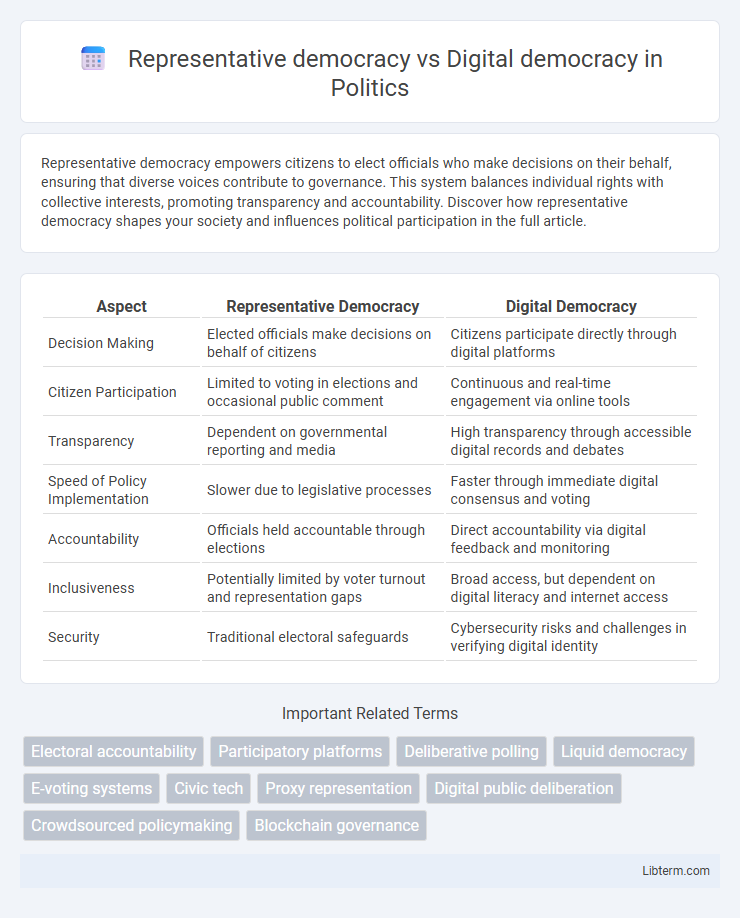Representative democracy empowers citizens to elect officials who make decisions on their behalf, ensuring that diverse voices contribute to governance. This system balances individual rights with collective interests, promoting transparency and accountability. Discover how representative democracy shapes your society and influences political participation in the full article.
Table of Comparison
| Aspect | Representative Democracy | Digital Democracy |
|---|---|---|
| Decision Making | Elected officials make decisions on behalf of citizens | Citizens participate directly through digital platforms |
| Citizen Participation | Limited to voting in elections and occasional public comment | Continuous and real-time engagement via online tools |
| Transparency | Dependent on governmental reporting and media | High transparency through accessible digital records and debates |
| Speed of Policy Implementation | Slower due to legislative processes | Faster through immediate digital consensus and voting |
| Accountability | Officials held accountable through elections | Direct accountability via digital feedback and monitoring |
| Inclusiveness | Potentially limited by voter turnout and representation gaps | Broad access, but dependent on digital literacy and internet access |
| Security | Traditional electoral safeguards | Cybersecurity risks and challenges in verifying digital identity |
Introduction to Representative Democracy and Digital Democracy
Representative democracy involves elected officials making decisions on behalf of citizens, ensuring governance through structured political institutions and periodic elections. Digital democracy leverages online platforms and information communication technologies to enable broader citizen participation in political decision-making processes. Both systems aim to enhance democratic engagement, with representative democracy emphasizing delegation and digital democracy focusing on direct citizen involvement through digital means.
Key Principles of Representative Democracy
Representative democracy operates on the key principles of elected officials acting as proxies for the citizenry, ensuring accountability through regular, free, and fair elections. This system emphasizes the rule of law, separation of powers, and protection of minority rights within a structured political framework. Digital democracy, by contrast, enhances citizen participation through online platforms but still relies on these foundational principles to maintain legitimacy and governance stability.
Core Features of Digital Democracy
Digital democracy emphasizes direct citizen participation through online platforms, enabling real-time voting, policy discussions, and feedback mechanisms that surpass traditional representative democracy's periodic elections. Core features include transparency via blockchain technology, increased accessibility through digital interfaces, and enhanced engagement through social media integration. These elements collectively foster a more inclusive, efficient, and accountable democratic process.
Historical Evolution of Democratic Systems
Representative democracy emerged prominently in the 18th century with the rise of constitutional governments, emphasizing elected officials as intermediaries between the populace and legislative processes. Digital democracy, evolving in the 21st century, integrates internet-based technologies to facilitate direct citizen participation in decision-making, increasing transparency and engagement. The historical evolution from representative to digital democracy reflects a shift towards more inclusive, real-time interaction between governments and their constituents, enabled by advancements in communication technology.
Advantages of Representative Democracy
Representative democracy offers efficient decision-making through elected officials who possess expertise and accountability, ensuring stable governance even in large populations. It allows citizens to delegate authority, reducing the complexity and time commitment required for direct participation. This system also safeguards against the volatility of public opinion by enabling informed deliberation and long-term policy planning.
Benefits of Digital Democracy
Digital democracy enhances political participation by utilizing online platforms that enable broader citizen engagement and real-time feedback. It increases transparency and accountability through accessible information and open communication channels between government officials and the public. Enhanced convenience and inclusivity reduce barriers for marginalized groups, fostering a more equitable and representative political process.
Challenges Facing Representative Democracy
Representative democracy faces significant challenges such as voter apathy, political polarization, and limited accountability of elected officials. The system often struggles to adequately reflect diverse public opinions and rapidly changing social dynamics. Digital democracy proposes solutions through enhanced citizen engagement and real-time feedback, but implementation hurdles remain.
Risks and Limitations of Digital Democracy
Digital democracy presents risks such as cybersecurity threats, including hacking and data breaches that compromise voter privacy and election integrity. The digital divide exacerbates inequalities by limiting access for disadvantaged populations, undermining inclusive participation. Furthermore, the spread of misinformation and algorithmic biases can distort public opinion and decision-making processes, challenging the legitimacy of digital democratic systems.
Case Studies and Global Examples
Representative democracy, exemplified by the U.S. Congress and the UK Parliament, relies on elected officials to make decisions on behalf of citizens, offering stability but limited direct citizen participation. Digital democracy models, such as Iceland's constitutional reform using online platforms and Estonia's e-voting system, showcase increased public engagement through technology, enabling more transparent and inclusive decision-making processes. Global examples indicate digital tools enhance participatory governance but require robust cybersecurity and digital literacy to prevent exclusion and manipulation.
The Future of Democratic Governance
The future of democratic governance increasingly balances between representative democracy, where elected officials make decisions on behalf of citizens, and digital democracy, which leverages technology to facilitate direct citizen participation and real-time policy feedback. Digital democracy platforms such as online voting, e-petitions, and virtual town halls enhance transparency and inclusiveness, potentially reducing the democratic deficit often observed in traditional representative systems. Integrating secure digital tools with established democratic institutions promises a hybrid model that amplifies citizen engagement while preserving the stability and accountability of representative governance.
Representative democracy Infographic

 libterm.com
libterm.com